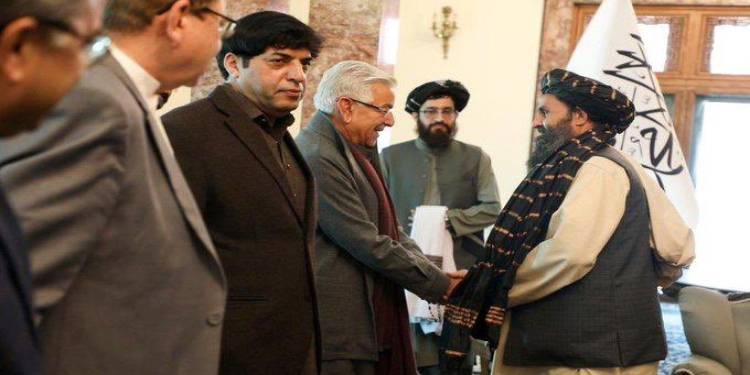
Pakistan and Afghan Taliban are discussing a plan to 'resettle' the Tehreek-e-Taliban Pakistan (TTP) in another attempt to address the perpetual issue of cross-border terrorist attacks that have severely threatened bilateral ties.
The idea of resettlement came from the Taliban side during the recent high-profile visit of Pakistani defence minister Khawaja Asif and Inter Services Intelligence (ISI) chief Lt. General Nadeem Anjum to Kabul, according to reporting by Kamran Yousaf.
Yousaf's report said that the purpose of the visit was to let the Afghan Taliban know that Pakistan will not seek to hold talks with the banned TTP, as it exploited previous peace initiatives to regroup and target Pakistan again and again.
In light of Islamabad's apprehensions, Kabul proposed a plan that involves disarming the TTP and relocating its members far away from Pak-Afghan border areas. Unlike previous such measures, this time TTP members will be resettled inside Afghanistan.
The Taliban, however, have asked Islamabad to bear the expenses of this plan, and that the execution part still "poses a challenge". Moreover, Pakistan wants any such step to be "completely irreversible".
Read this too: Afghan Taliban Claim IS Khorasan Chief Killed In Kabul Operation
At present, there are said to be some 8,000 to 12,000 TTP militants inside Afghanistan, and the estimate rises to 30,000 if their family members are included.
During the recent visit, representatives of the Taliban government were provided with proof of TTP militants operating freely inside Afghanistan, along with their recent locations.
Pakistan faces intense pressure from the TTP, whose fighters claimed responsibility for a deadly bombing inside a mosque at the Peshawar police lines last month, and a recent attack on Karachi Police Office which lasted for at least four hours.
Over the past few months, the country’s security situation has worsened, with proscribed terrorist groups like the TTP, Islamic State, Hafiz Gul Bahadur network, and Baloch separatists executing the attacks with impunity across the country.
The TTP ended its ceasefire with the government in late November 2022, ordering its members to carry out attacks in Pakistan.
Since then, Pakistan is struggling to deal with the menace of terrorism, even as violent militancy in the country is increasingly being seen as the result of decades the nation-state spent in breeding religious extremism, while simultaneously fueling a sense of deprivation among marginalised communities like the Baloch.
The idea of resettlement came from the Taliban side during the recent high-profile visit of Pakistani defence minister Khawaja Asif and Inter Services Intelligence (ISI) chief Lt. General Nadeem Anjum to Kabul, according to reporting by Kamran Yousaf.
Yousaf's report said that the purpose of the visit was to let the Afghan Taliban know that Pakistan will not seek to hold talks with the banned TTP, as it exploited previous peace initiatives to regroup and target Pakistan again and again.
In light of Islamabad's apprehensions, Kabul proposed a plan that involves disarming the TTP and relocating its members far away from Pak-Afghan border areas. Unlike previous such measures, this time TTP members will be resettled inside Afghanistan.
The Taliban, however, have asked Islamabad to bear the expenses of this plan, and that the execution part still "poses a challenge". Moreover, Pakistan wants any such step to be "completely irreversible".
Read this too: Afghan Taliban Claim IS Khorasan Chief Killed In Kabul Operation
At present, there are said to be some 8,000 to 12,000 TTP militants inside Afghanistan, and the estimate rises to 30,000 if their family members are included.
During the recent visit, representatives of the Taliban government were provided with proof of TTP militants operating freely inside Afghanistan, along with their recent locations.
Pakistan faces intense pressure from the TTP, whose fighters claimed responsibility for a deadly bombing inside a mosque at the Peshawar police lines last month, and a recent attack on Karachi Police Office which lasted for at least four hours.
Over the past few months, the country’s security situation has worsened, with proscribed terrorist groups like the TTP, Islamic State, Hafiz Gul Bahadur network, and Baloch separatists executing the attacks with impunity across the country.
The TTP ended its ceasefire with the government in late November 2022, ordering its members to carry out attacks in Pakistan.
Since then, Pakistan is struggling to deal with the menace of terrorism, even as violent militancy in the country is increasingly being seen as the result of decades the nation-state spent in breeding religious extremism, while simultaneously fueling a sense of deprivation among marginalised communities like the Baloch.

